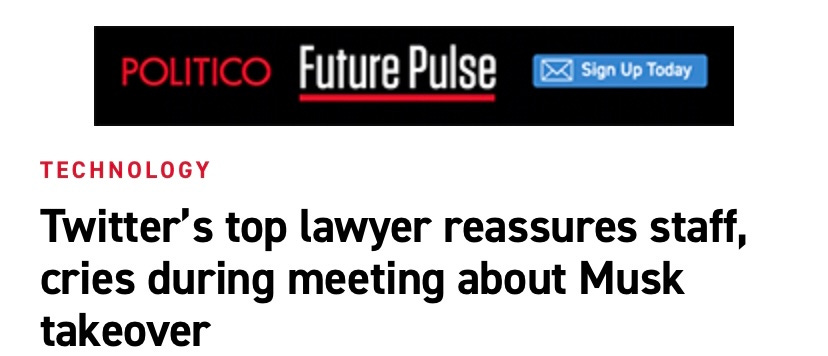Elon Owns the Libs—Literally
The censorship cult melts down
The lockdown left is having a rough week. Shortly after a federal court struck down the airline mask mandate, Twitter’s board officially accepted Elon Musk’s offer to buy the company.
It’s hard to see why the left is so upset about the purchase, given Musk has promised to permit all legal speech and they’ve always insisted that Twitter’s censorship was politically neutral. And anyway, even if it wasn’t, they told us, Twitter is a private company—it can do whatever its owners want!
Many lamented the fact that Musk was spending $44 billion to buy Twitter instead of using that money to house the homeless, fight climate change, or give to the government outright.
Oddly, none of these commentators seem concerned by the fact that Twitter’s prior owners are now $44 billion richer—but aren’t using that money to house the homeless, fight climate change, or give to the government. Others announced that they’d be protesting Musk’s takeover of Twitter by boycotting the platform—a welcome solution.
As for Covid, it’s reasonable to assume that Musk’s purchase is a victory for lockdown skeptics, though it’s unclear how big the effect will be and when we’ll see it. Twitter is full of stories of long-banned accounts being restored, but it’s unlikely that Twitter’s bureaucracy has changed that quickly—this is more likely owing to more users appealing their suspensions following Musk’s announcement.
Conservatives have been celebrating what they see, rightly, as a move that will help them politically in the near term. But in the long-term, Musk’s purchase is far more significant in shedding light on just how much power social media platforms have amassed over our political discourse.
Commentators often talk about the separation of church and state—but far more significant and under-emphasized is the separation of private ownership and state. In the Middle Ages, nearly all private wealth was invested in military resources. As feudal empires matured, nobles were able to form their own private institutions—with the understanding that they wouldn’t threaten the political system. This principle became enshrined within modern republics as a norm that the lives of citizens and their discourse shouldn’t be very affected by who owns what private assets—with certain narrow carve-outs for things like news outlets, non-profits, and campaign contributions.
The howls of left-leaning politicians and elites about Musk’s purchase of Twitter are a tacit admission that they may not be politically viable without the power to systematically purge their most articulate critics from political discussions unbeknownst to the vast majority of the public—a power unprecedented in democratic societies.
Michael P Senger is an attorney and author of Snake Oil: How Xi Jinping Shut Down the World.





Musk needs to upgrade his security team, and hire two tasters.
The neo-communists will NOT allow their ability to mute patriots get defanged.
No doubt it's purely a coinky-dink, but Biden's main muscle, the DHS, announced yesterday they are forming a Ministry of Truth, calling it “Misinformation and Disinformation Governance Board”.
As if...
Evil abounds.
Pray for America.
Michael, Twitter's crying employees are not busily processing appeals, they're covering their tracks before Musk takes over and releases the censorship algorithm, lest the left gives away too many trade secrets and face pressure to open up FB and Google.